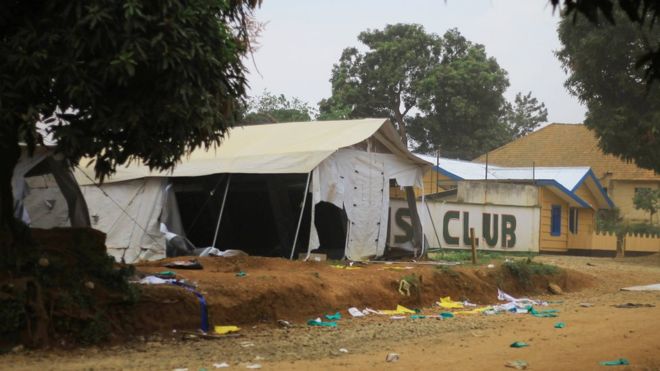DR Congo election: Protesters attack Ebola centre in Beni
Protesters angry with the postponement of Sunday’s presidential election in parts of the Democratic Republic of Congo have attacked a clinic where possible Ebola cases are assessed.

The attack happened in the eastern city of Beni, one of three opposition areas where the vote has been postponed.
The electoral commission has cited the current Ebola outbreak as one of the reasons behind the postponement.
But opposition parties have accused the authorities of seeking to rig the vote.
Along with Beni, voting has been postponed until March in Butembo, also in the east and in Yumbi, which is in the west.
With President Joseph Kabila’s successor due to be sworn in next month, it appears the votes of more than a million people could be discounted.
But in an interview with the BBC, Mr Kabila insisted that postponing the vote until after the final result was due to be declared was lawful.
“Don’t worry, the law has catered for such issues,” Mr Kabila said.
“I don’t think there will be any major issues inasfar as the one-point-something million voters that you are talking about,” he added.
DR Congo has not had a peaceful and democratic transfer of power since independence from Belgium in 1960.
Mr Kabila, who has been in office since 2001, was meant to have stepped down in 2016.
However, the election to choose his successor has been continually postponed, amid unrest and logistical difficulties in a nation with poor infrastructure.
Opposition supporters suspect Mr Kabila is trying to cling on to power. He denies the allegation and is backing former Interior Minister Emmanuel Ramazani Shadary in the election.
Meanwhile, the country’s foreign ministry has unexpectedly announced the expulsion of European Union ambassador Bart Ouvry, saying he has 48 hours to leave.
For weeks the government has been criticising the EU’s decision to renew sanctions against Congolese officials, saying these are interfering with the electoral process in the country.
One of those affected by the sanctions, former Interior Minister Emmanuel Ramazani Shadary, is now running for president. He was first sanctioned in 2017 for human rights violations.
What happened at the Ebola centre?
Some people inside the Ebola assessment centre fled after it was attacked, a witness told the BBC.
The police then arrived and fired shots in the air to disperse the crowd, the witness added.
During the attack, some tents were burnt down and tables and chairs were stolen, health ministry spokeswoman Jessica llunga told the BBC.
Of the 21 who fled the centre, 17 had tested negative for Ebola once and were doing a second test while four others were doing a test for the first time, she added.
Eleven of those who fled later returned but were “traumatised” by the attack, authorities said.
“They came back because they understand that fast and adequate care will increase their chance of survival if they prove to be infected by the Ebola virus,” a health ministry statement said.
Beni has been badly hit by the Ebola outbreak in the east of the country, which has killed more than 300 people since August.
In Goma, the main city in eastern DR Congo and also an opposition stronghold, crowds blocked a road in the Majengo neighbourhood and around the university, the BBC’s Gaius Kowene reports from the scene.
Anti-riot police were positioned at some street corners in Majengo, and protesters retreated after tear gas was fired, he adds.
There were also protests in Butembo. No demonstrations have been reported in Yumbi. BBC






